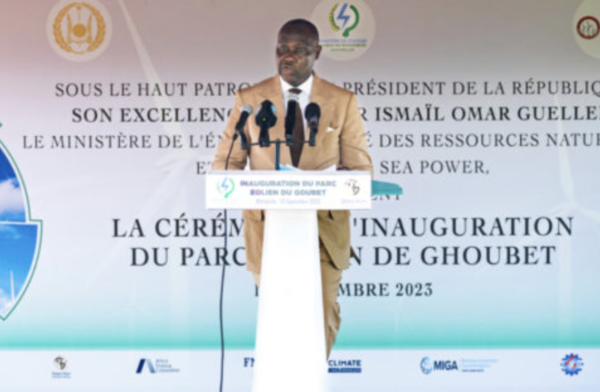From our special envoy to Djibouti, Abdoulaye Ba, reporter.
Africa Finance Corporation (AFC) as super lessor of the country’s first IPP
On September 10, 2023, a landmark launch ceremony took place in Djibouti, a strategic country, located in the Horn of Africa. President Ismaïl Omar Guelleh proceeded to the historic inauguration of the very first wind farm in the country, thus embodying his announced ambition to make it the first in Africa to rely exclusively on renewable sources for its electricity. here 2035.
The Red Sea Power (RSP) wind farm, near Ghoubet Bay, will provide 60 megawatts of clean energy, increasing overall capacity by 50% and avoiding 252,500 tonnes of CO2 emissions annually, the equivalent of more than 55,000 buses. The site covers 387 hectares, the equivalent of more than 700 football fields. The park’s 17 Siemens turbines each produce 3.4 MW, served by a 220 megavolt ampere (MVA) substation and connected by a 5 km overhead transmission line to the local grid operator and storage facilities.
The project, the first notable international investment in the energy sector in Djibouti, amounting to USD 122 million, creates the country’s first independent power producer (IPP) and will serve as a model for future private investments.
An additional 45 MW of renewable energy capacity is already expected by the consortium of investors led by RSP and comprising infrastructure solutions provider Africa Finance Corporation (AFC) as lead developer; the Dutch entrepreneurial development bank FMO; the mixed finance fund manager Climate Fund Managers (CFM); and Great Horn Investment Holding (GHIH), an investment company owned by a unit of the Djibouti Ports and Free Zones Authority and the Djibouti Sovereign Fund.
Until then, Djibouti was entirely dependent on electricity generated from imported fossil fuels, as well as electricity generated from hydrogen imported from neighboring Ethiopia. Less than half of the 123 MW of installed national capacity is poorly operational due to the age of the diesel power plants.
The new wind power plant will boost industrialization, job creation and economic stability as Djibouti seeks to leverage its strategic position as a global transshipment hub.
The country has enough wind, solar and geothermal resources to triple its current capacity to over 300 MW. Djibouti also hosts the world’s highest concentration of foreign military bases due to its geographical location at the entrance to the Bab el-Mandab strait, the corridor used by 30% of world trade. The new wind farm provides an opportunity for these bases and other currently off-grid businesses to decarbonize and replace their mostly diesel-generated electricity with clean energy.
Leveraging its seaports to diversify the economy, Djibouti set out to build an industrial zone in 2017, prompting preliminary talks on building energy capacity. The wind farm consortium was established in 2018 and subsequently provided an equity bridge loan through AFC, FMO, CFM’s Climate Investor One Fund, and GHIH, which enabled the project to close its financing in one go. record time (22 months). Work began in January 2020 and has continued apace despite global supply challenges caused by Covid-era lockdowns.
Make Djibouti the first 100% clean and green African economy
High-level figures, such as President Ismail Omar Guelleh, Prime Minister Abdoulkader Kamil Mohamed and Minister of Energy Yonis Ali Guedi, were present. This initiative aims to make Djibouti the first 100% clean and green African economy, running solely on solar and wind energy.
The project is in line with Djibouti’s Vision 2035, which provides for the creation of special economic zones and logistical infrastructure.
The energy generated by the new renewable installations will not only support carbon-neutral industrialization but can also be used to power a new eco-friendly processing facility for refueling transshipment vessels.
The Africa Finance Corporation (AFC) played a crucial role in financing the project. According to Samaila Zubairu, CEO of AFC, an institution which has already deployed $12.6 billion in projects across the continent, this project is “truly special” because it demonstrates what is possible in terms of sustainable development in Africa. “.
Another distinctive element of the project is its commitment to local communities. “For example,” continues the boss of the AFC, “a desalination plant was integrated into the project to provide clean water to underserved regions, thus reducing the risk of disease and freeing up time, particularly for women. and girls, for education and gainful employment”.
This wind farm is therefore more than just a technological advance; it is the symbol of positive and lasting change which, according to its supporters, could serve as a model for future development in Africa and beyond.



